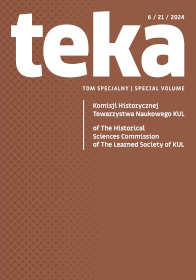Duszpasterze ewangelickich Zborów Niepolskich (niemieckich) a polityka wyznaniowa i narodowościowa PRL oraz polityka tożsamościowa Kościoła Ewangelicko-Augsburskiego w latach 1952-1993
Pastors of Evangelical Non-Polish (German) Churches vs. the Religious and Nationality Policy of the Polish People’s Republic and the Identity Policy of the Evangelical Church of the Augsburg Confession in Poland in 1952-1993
Author(s): Olgierd KiecSubject(s): History, Recent History (1900 till today), Post-War period (1950 - 1989), Transformation Period (1990 - 2010)
Published by: Towarzystwo Naukowe Katolickiego Uniwersytetu Lubelskiego Jana Pawła II
Keywords: Lutheranism; identity policy; confessional policy; German minority; Evangelical Church of the Augsburg Confession
Summary/Abstract: The article seeks to characterise the group of Lutheran clerics who exercised pastoral care in the communities of German Evangelical Christians in Lower Silesia and West Pomerania. After 1945, the only Lutheran Church that operated officially in Poland was the Evangelical Church of the Augsburg Confession, whose authorities pursued an identity policy emphasising the Polish character of the Lutheran faith and its tradition. The German Lutheran communities of Lower Silesia and West Pomerania, forming a legacy of the Prussian union of Evangelical churches, were not incorporated into the Evangelical Church of the Augsburg Confession, but came under its supervision and benefited from the pastoral care of clergy approved by the authorities of that Polish church. Finding pastors who could win the trust of German Lutherans and who would be loyal to Polish ecclesiastical and state authorities proved difficult. Most of them originated from the Polish-German borderland, which enabled them to hide or reveal their views and identity as they saw fit. Given the circumstances, the nationality policy of Polish authorities and the identity policy of Polish Lutherans could not fully Polonise the Germans and dissolve German Lutheran communities existing in the Regained Territories.
Journal: Teka Komisji Historycznej Towarzystwa Naukowego KUL
- Issue Year: 21/2024
- Issue No: Special
- Page Range: 435-453
- Page Count: 19
- Language: Polish

